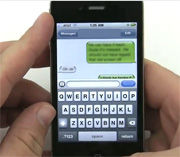
THURSDAY, April 5 (HealthDay News) — College students are texting frequently during class time, and that may interfere with their ability to pay attention and learn, a new study finds.
It included 190 University of Pittsburgh students who completed a questionnaire that asked them how many text messages they sent and received during a class and how much they learned in the class.
On average, students read 2.6 text messages and sent 2.4 texts while in the class.
Students who did less texting during class also tended to be those who had more self-control and reported paying more attention to the instructor. The kids with more self-control and who paid attention got better grades and felt they learned more in the class than those with less self-control.
The study appears online and in the July print issue of Communication Education.
“We know from our past research that college students who are regular text users habitually engage in text messaging during class lectures,” principal author Fang-Yi Flora Wei, an assistant professor of broadcast communications at the University of Pittsburgh at Bradford, said in a journal news release.
“Now we see that in-class texting partially interferes with a student’s ability to pay attention, which prior studies show is necessary for effective cognitive learning,” she added.
“College students may believe that they are capable of performing multitasking behaviors during their classroom learning, such as listening to the lecture and texting simultaneously,” Wei said. “But the real concern is not whether students can learn under a multitasking condition, but how well they can learn if they cannot sustain their full attention on classroom instruction.”
She does not believe banning texting during class would be as effective as instructors using interactive teaching methods or other strategies to keep students’ attention.
More information
The American Academy of Pediatrics has more on kids and media use.

